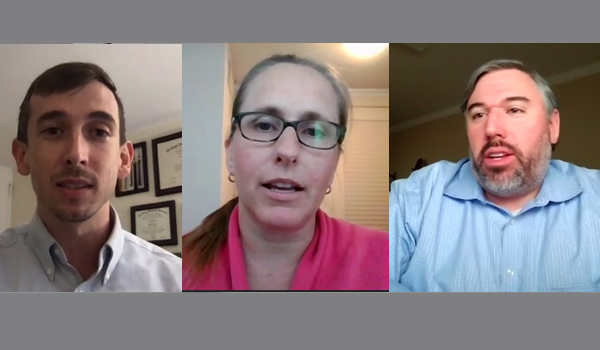
On June 30, 2020, Catholic Law's Office of Development and Alumni Relations hosted a virtual discussion of COVID-19 and Rescuing Small Business. Professor Megan La Belle, Co-Director of the Law and Technology Institute, moderated a discussion with Daniel Kane ’15, Chief, Founder of the Law Office of Daniel T. Kane, PLLC; and Isaias “Cy” Alba IV ’04, Partner at Pilero Mazza PLLC.
Cara H. Drinan, Director of Faculty Research, welcomed the evening’s guests before turning the floor over to La Belle to provide a brief overview of the Coronavirus Aid, Relief, and Economic Security (CARES) Act, the Paycheck Protection Program (PPP), and the Small Business Administration’s (SBA) role in administering aid during COVID-19. La Belle made particular note of how quickly the CARES Act was signed into law and the ramifications of rushing into fast, direct relief.
La Belle then began the in-depth discussion by first noting that the CARES Act is administered by the SBA and “In ordinary circumstances, before an agency like the SBA issues regulations with respect to a new program or a new law, like the PPP or the CARES Act, it would have to provide an opportunity for what is called “Notice and Comment.” So, under the APA—the Administrative Procedure Act—in normal circumstances, the agency has to publish in the federal register the proposed rule, and then interested parties have the opportunity to comment on that rule […] but because of the circumstances of the pandemic and the circumstances under which the CARES Act was enacted, the CARES Act allows for emergency rulemaking and waives the notice requirements […] this has raised a host of issues and problems for clients of practitioners like Dan and Cy.”
Alba noted that private practitioners very quickly figured out what questions were coming up as clients brought concerns to him. Without Notice and Comment, the SBA was moving so fast that it was hard to keep up. From Alba’s experience, “everything was being treated as a regulation, essentially, even though it wasn’t. Even now there are things that are just ‘Q and As,’ but are being treated like regulations.”
Kane agreed, “A lot of [my clients] were trying to react as quickly as possible to changes in the regulations that immediately took effect. Notice and Comment allows for people to meaningfully participate in the process—to raise concerns, to provide alternatives." Kane continued how nearly daily, clients were facing new and differing sets of rules. “The SBA has the intent to help small businesses. They want to help those getting most impacted, and unfortunately, they didn’t really have the time to act accordingly. Because of that, you had a lot of these changes happening and people freaking out, because they wanted the money that they desperately needed.”
As the discussion drew to a close, Alba and Kane also explored how retroactive rules and vague language within the regulations would affect those who applied for loans—hinting at trouble in potential audits and future litigation. They concluded that there will be a lot more to come on the subject.
The next installment in the COVID-19 and the Law virtual series is scheduled for August 6, 2020. Moderated by Professor Susanna Fischer, the discussion will address COVID-19 and Legal Implications for the Fashion Industry.
